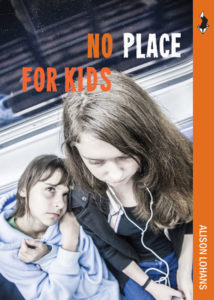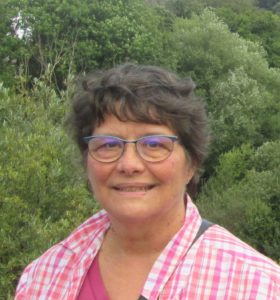The Evermore Centre Interviews Local Author Alison Lohans about her book “No Place for Kids”
Alison Lohans is an award-winning Regina-based author of 26 books for young people and teens. She has given more than 1000 author talks about her work, and writing, in schools and libraries. Additionally, she has taught writing and worked as an editor.
This month The Evermore Centre has chosen to shine a light on Childhood Trauma and the importance of being Trauma Informed when caring for children who have had adverse early childhood experiences. With this in mind, could you tell us a little about the book you have published titled No Place for Kids?
No Place for Kids features young Sarah and her older sister Jennifer, whose once-comfortable life is shattered by the death of their mother. Their dad turns to drinking for solace, and things fall apart even more: he first loses his job, then begins pawning off their furniture, and eventually loses their house. When the story opens, this small family has been surviving by travelling around Western Canada, staying first with one of Dad’s “buddies”, then another and another, a few months each time. These are often grungy “party houses” where nobody has any interest in providing responsible care for the two sisters. At this point the girls haven’t been in school for quite a while. Their only other living relative is their Aunt Ellen in Vancouver. In yet another “buddy’s” home in Winnipeg, they encounter Wes, a creepy character who seems to have an “unnatural” interest in the girls. Jen, the older sister, reaches a point at which she’s not willing to take any more – and so, with a small amount of cash saved from doing odd jobs, the two hungry girls take off in the middle of the night, planning to make their way to Aunt Ellen, whom they know will provide a loving home for them. Jen’s meagre savings only cover the cost of bus tickets to Regina, where the two are suddenly truly alone and must depend on their wits for survival – which is a particular challenge for Sarah when the bossy Jen gets sick. Hiding out in garden sheds and a neighbourhood school, it’s a struggle simply to eat, let alone buy more bus tickets – until Sarah defies her older sister and tells a bit of their story to a new schoolyard friend, while Jennifer gets picked up for stealing. Finally, Social Services becomes involved and the girls will be assisted for the remainder of their trip to Aunt Ellen in Vancouver.
What does this book mean to you and why did you feel compelled to write about the main characters; Jennifer and Sarah’s often painful but resilient experience?
No Place for Kids started out as a companion book to another one of my books for younger readers, Mystery of the Lunchbox Criminal (Scholastic Canada, 1990). That chapter book for grades 3-4 involved kids’ lunches going missing at school, with JJ and his friends needing to solve the mystery of the “criminal” who was stealing the lunches. That it turned out to be a pair of sisters, runaways, opened up a huge spectrum of childhood traumas that far overshadow the day-to-day issues faced by most middle class children. So there it was – an enormous well of human challenges: of abandonment on virtually all levels, leaving it up to sisters Jennifer and Sarah to take matters into their own hands, in taking on the risks of striking out for a better life (and survival) when it was clear that the adults around them were totally incompetent in parental roles, in the face of their own personal weaknesses. I wanted to point out that kids are capable of figuring out workable, options, and of summoning up the courage to take action in search of a better life. It also opened up so many layers of challenges faced by the homeless – particularly when no adult is around to take charge.
What do you hope both young adult and adult readers can take away from their experience in reading No Place for Kids?
There are a number of things I hope readers will keep in mind after reading No Place for Kids:
- It’s important to think issues through from several different perspectives because actions have consequences
- People in positions of responsibility for others need to consider their needs first, before indulging in their own wishes
- It’s important to keep in mind that people can and should speak up if something is wrong
- It’s not wrong to ask for help when help is needed
- Substance use and over-use is not an appropriate means for dealing with emotional pain. Instead, turning to counselling will help strengthen a person and assist them with positive decision making.
- Young people shouldn’t be underestimated: they are capable of making plans and carrying them out
The importance of working to sustain one’s needs, rather than leaning upon others
Do you wish to share any personal thoughts about the valuable knowledge that youth and adults can gain when they read stories like No Place for Kids. In terms of gaining empathy, understanding and a different world view?
There are many, many things that we take for granted in our day-to-day lives. It’s important to be aware of this, and to recognize that many others are not so privileged. It may be hard to know if – or when –we should step in to help … however, we shouldn’t turn a blind eye to such situations. Stories such as No Place for Kids can provide excellent springboards for discussion in classrooms and other areas, opening people’s thinking toward greater consideration for, and empathy toward, others. They may also provide opportunities to become aware of community and provincial departments and resources that have the knowledge and expertise to provide help in challenging situations.
The Evermore Centre wishes to express our gratitude to Alison Lohans for providing an inside look at the writing of her published work; No Place for Kids. This book is available through the Carol Bothwell Resource Library at the Evermore Centre. For more information on No Place for Kids and Alison’s other books, please visit her Facebook Page and Website.


